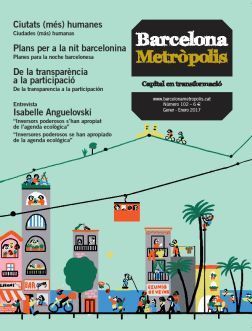The world’s population is now mostly urban and will be progressively more so in the future. Cities will hold an unprecedented concentration of people, and both our happiness and our creativity and efficiency will largely depend on how good we are at making a habitat for ourselves that doesn’t become dehumanized. Indeed, the future of mankind depends on the city, currently one of the main instruments of progress with which to face the future. And the changing times that we live in will force us to rethink the very concept.
A local authority has limited room for manoeuvre as it tries to guide the changing course of a city. The disorder that is inherent in any spontaneous action can never be completely regulated by local government and nor should it be. In areas that laws or municipal directives don’t reach, life has a way of creeping through the cracks to affirm itself and create new tensions and contradictions for us. Today more than ever, we need to rehabilitate life in the cities before it becomes simply the survival of the fittest.
At a time when market forces and speculation appear to be ruling over us more powerfully than ever, Barcelona needs to redouble its efforts to ensure basic rights like access to housing and public space that is free of coercion. Throughout 2016 the Architects’ Association of Catalonia (COAC) organised the Architecture Congress, an event that had not been held since 1996. The lectures and discussions that were held resulted in a commitment to the new values of participation, equality and sustainability.
Citizens live under constant attack from structural and symbolic assaults that force us to think of intolerable situations as normal, everyday things, which have become part of a momentum that is very difficult to halt. We talk of gentrification, energy poverty, transport deficiency, noise, segregation, touristification of the public space, etc. In response to these destabilising factors that jeopardise a large part of the urban population, we now have the concept of the “right to the city”, a set of rights that brings together a minimum common denominator of guarantees under one umbrella.
The right to the city is not about the right to live in one, which is obviously anyone’s right, but about the ability of those who already form part of the urban fabric to access basic services and a shared public space. Wherever ad-hoc market forces cannot guarantee this, it will be provided by force through urbanity, the ethics of the city, which is simply the set of shared tools that a community has for living together in a particular space. While urbanism is the responsibility of the authorities, urbanity will depend on the citizens, because it requires of us a sense of community that can only be built on the basis of collective generosity.
This right is not viable without the duties of citizenship that go with it. The sense of urbanity cannot just be about being polite and courteous or a code of conduct for road users. It will also demand a shared vision: respect for differences, social empathy, environmental awareness and the will to participate in collective governance. A free and open city by all means, but with the refinement of urbanity.





